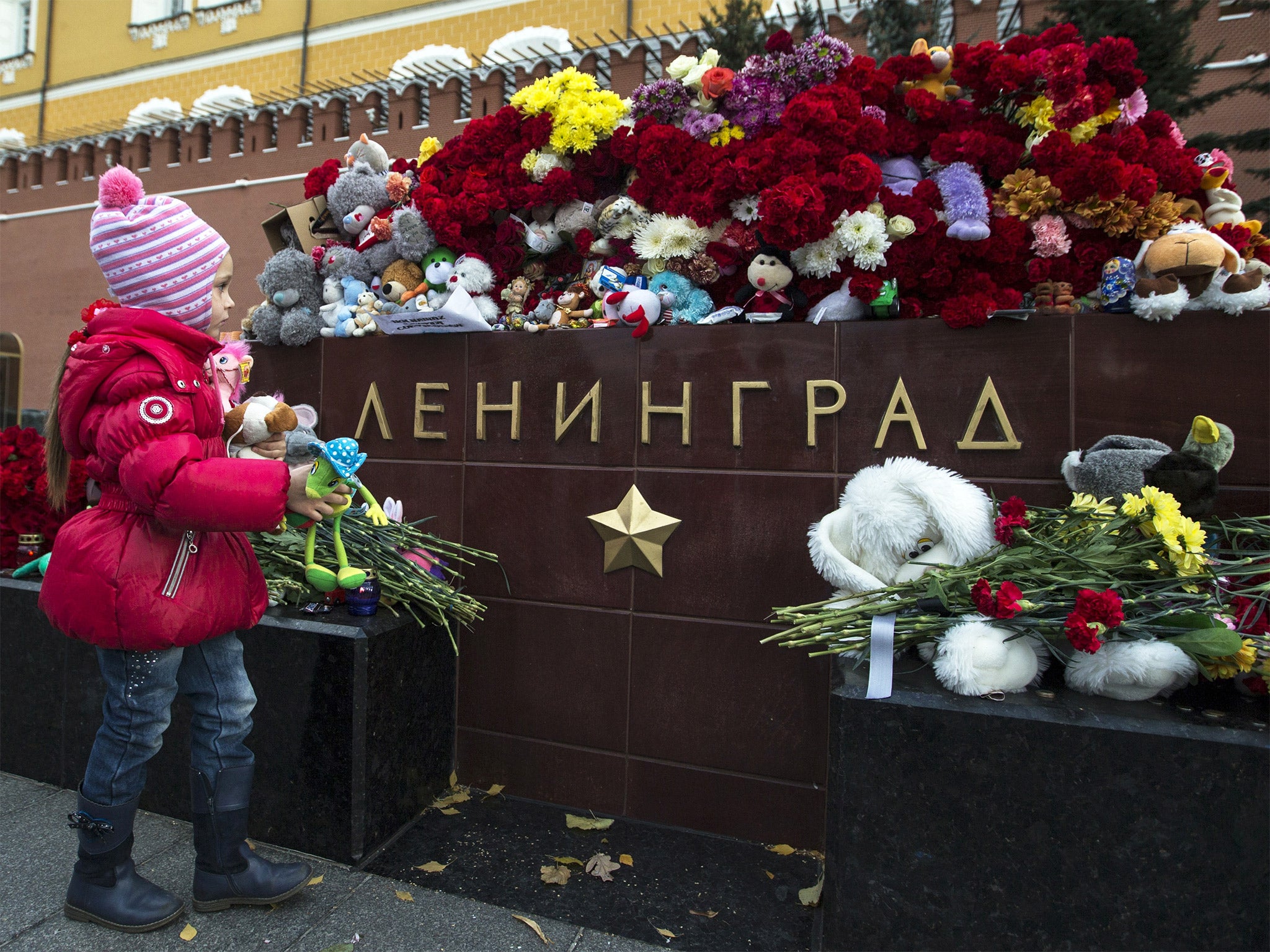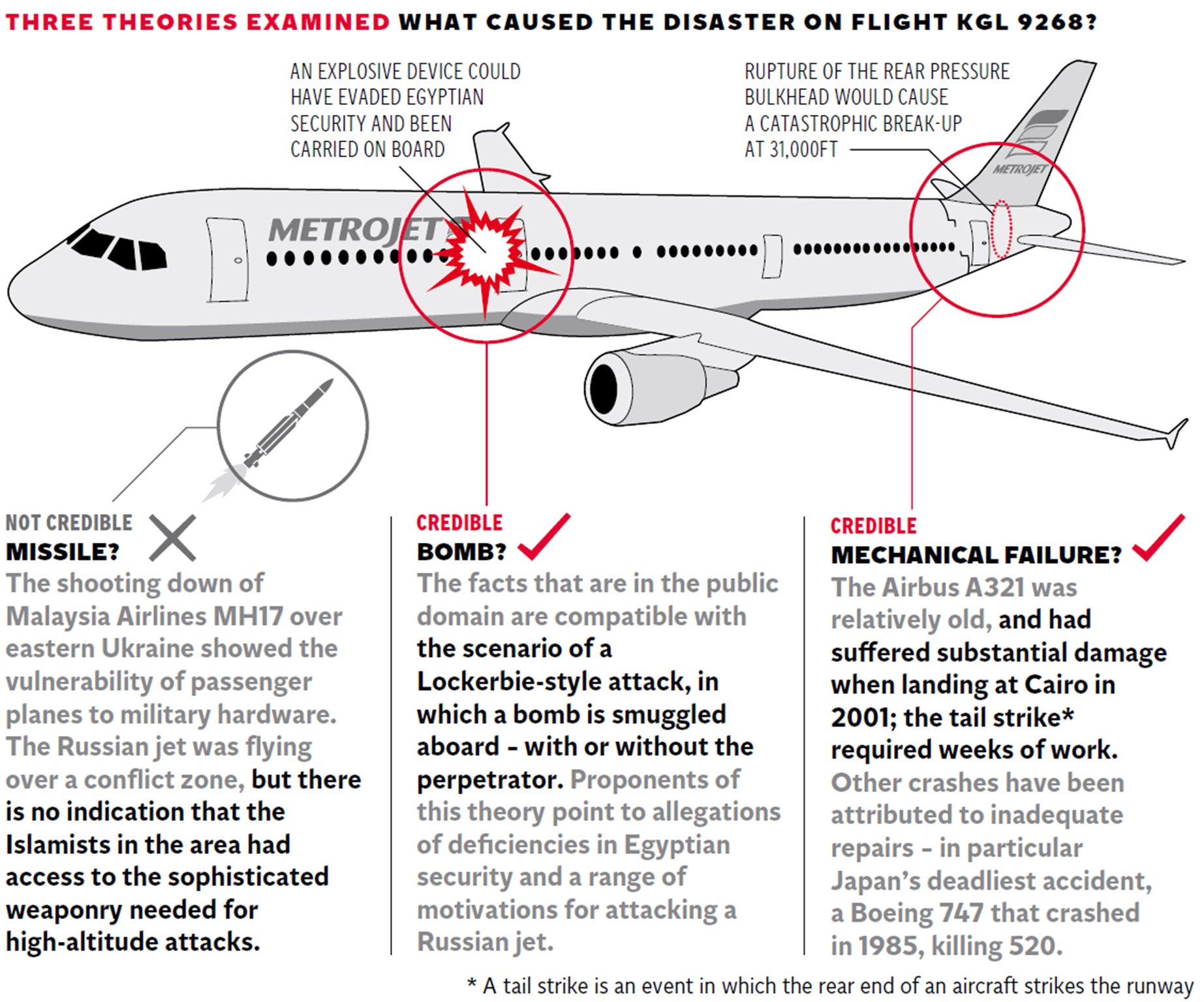Russian plane crash in Sinai: Mystery around disaster deepens amid reports of 'unusual sounds and flash of light'
Absence of distress call and 'uncharacteristic' sounds from inside plane may indicate events took place without warning

Moments before the Metrojet Airbus passenger jet crashed into the Sinai desert, killing 224 people, unusual sounds were heard from within the cockpit then a flash of light was detected in the sky by American satellites.
While the precise cause of the crash remains a mystery, the absence of a distress call from the plane’s pilots and “uncharacteristic” sounds heard from inside the plane just before it plunged to the ground may indicate that whatever happened took place suddenly and without warning.
An instant onboard cataclysm could explain the lack of a distress call from pilot Valery Nemov, and co-pilot Sergei Trykhachyov. “No communication from the pilot was recorded at the navigation centres requesting anything,” Mohamed Rahmi, a spokesman for Egypt’s Civil Aviation Ministry, said.
The respective Russian and Egyptian explanations for the last moments of the Metrojet flight have diverged. Russian investigators have said it is clear that the plane had broken up in mid-air. The Egyptians, including Mr Rahmi, warn against jumping to conclusions. “This could be a long process and we can’t talk about the results as we go along,” Mr Rahmi told Reuters news agency.
Earlier, a senior US defence official revealed that an American heat-sensing satellite had picked up evidence of a “flash or explosion” in the area at the time of the disaster but none of any missile striking the aircraft, which would have left its own heat trail.
Information collected from an initial analysis of the plane’s black boxes, currently being examined in Egypt, suggested that “sounds uncharacteristic of routine flights were recorded preceding the moment that the aircraft disappeared from radar screens”, according to a source.
Russian news agency Interfax quoted an unnamed source close to the investigation, who confirmed that pilots on board the flight, which crashed on Saturday killing all 224 people on board about 20 minutes after leaving Sharm el Sheikh en route to St Petersburg in Russia, had engaged in routine communication with air traffic control four minutes before the plane lost contact.
The unnamed US defence official told NBC News in the US that any speculation about a missile striking the plane was “off the table” in his view. He suggested that “the plane disintegrated at a very high altitude”, when, as the infrared satellite indicates, “there was an explosion of some kind”.
“Judging by the recording, a situation on board developed suddenly and unexpectedly for the crew, and as a result the pilots did not manage to send a distress signal,” the source said. Meanwhile, the Russian news wire Tass reported that unidentified and extraneous materials had been found at the crash site. “Experts have found material in the disaster area that were not part of the plane,” a source said.
Egypt’s President Abdul Fattah al-Sisi, who visits Britain this week, insisted Sinai was safe. “When there is propaganda that it crashed because of Isis, this is one way to damage the stability and security of Egypt and the image of Egypt,” he told the BBC. “Believe me, the situation in Sinai – especially in this limited area – is under our full control.”
Metrojet’s claim that the only possible explanation for the crash was “external impact” was also dismissed by Russia’s air transport chief, Alexander Neradko, who called the statement “baseless and not based on any real facts” given the lack of data on the crash currently available.

In Cairo, Mohammed Abdel Rahman, of Egypt’s Civil Aviation Ministry, told The Independent that “there is a world standard of safety from all planes” flying through Sharm el Sheikh airport, though he would not comment on Metrojet’s earlier claim that the crash was not caused by a technical fault or pilot error.
At a press conference with Metrojet in Moscow on Monday, deputy head of the airline Alexander Smirnov told journalists the company had “completely excluded technical error and an error on the part of the pilot” as possible causes for the disaster.
But one worker at Sharm el Sheikh airport spoke of consistent problems with the Airbus A321, and said the exact plane in question had a longstanding reputation for frequent technical problems, especially when landing. “The plane had problems with leaking gasoline,” he explained, saying he believed one of the plane’s V2533 engines exploded, causing the crash.
The plane had previously been leased to Saudi Arabian Airlines and Lebanon’s national Middle East Airlines (MEA) carrier. Observers have pointed to a particularly bad crash it suffered when landing at Cairo International Airport in 2001 while operated by MEA.
“Very often, the airline was asking for Egyptian airline engineers to fix its frequent technical problems,” the worker said.
Only 10 of the 140 bodies which were returned to St Petersburg on Monday have been identified by relatives.
Join our commenting forum
Join thought-provoking conversations, follow other Independent readers and see their replies
Comments
Bookmark popover
Removed from bookmarks